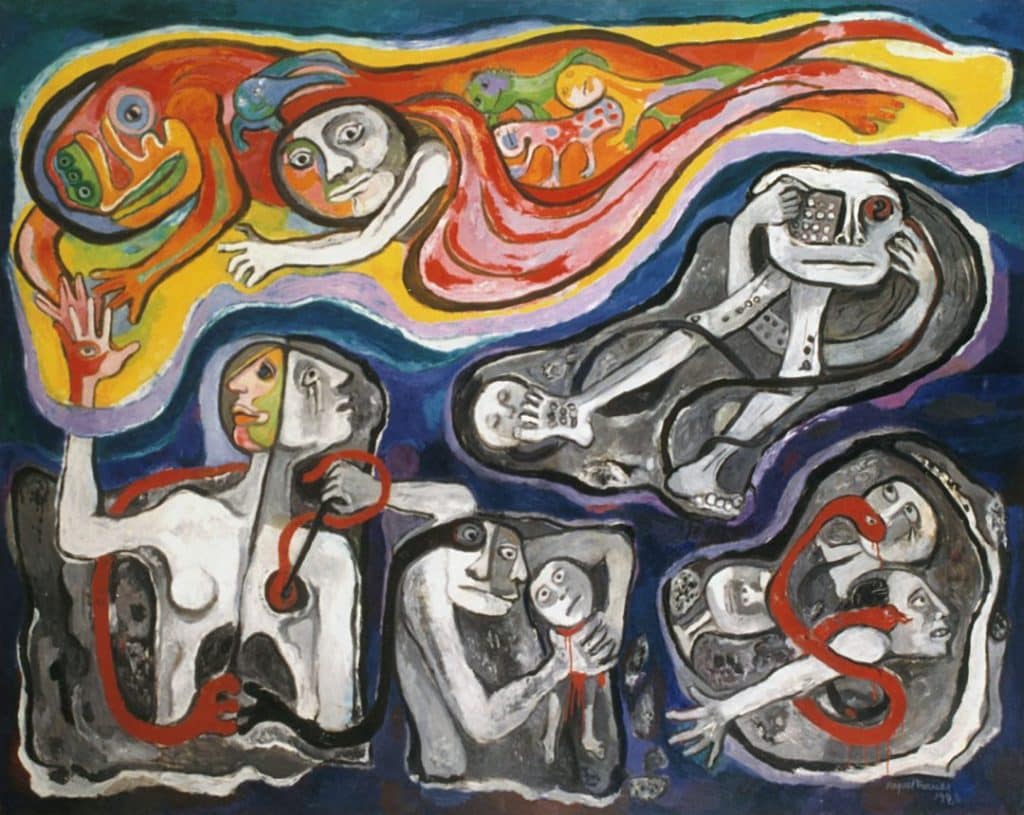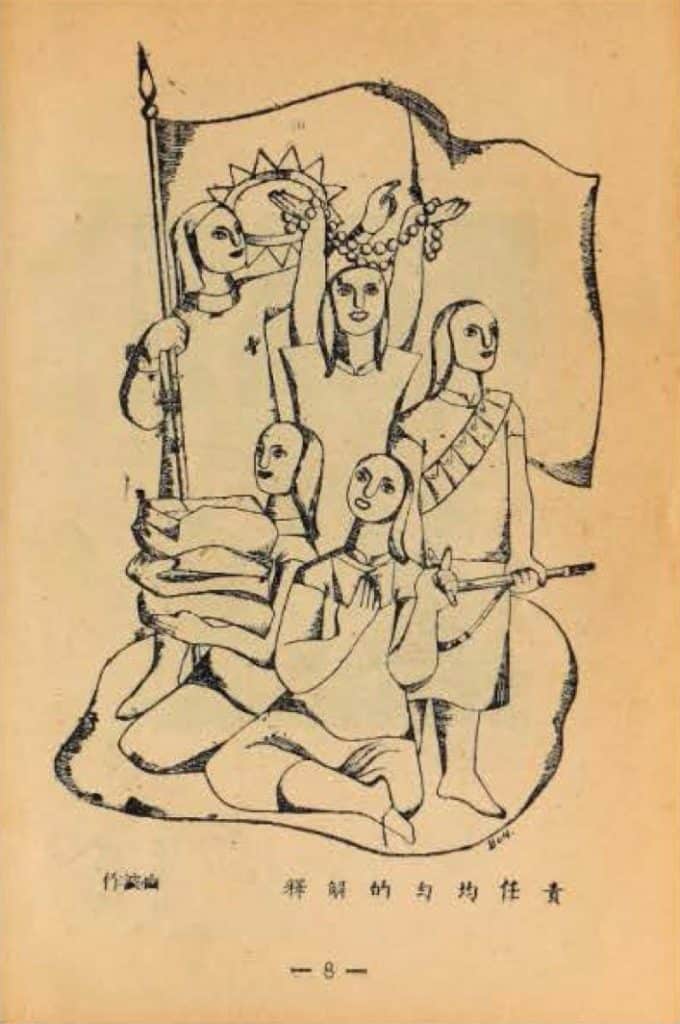Dear Friends,
Greetings from the desk of Tricontinental: Institute for Social Research.

Rocio Navarro (Mexico), Watering Day, 2024.
March is the month of International Working Women’s Day, a day deeply rooted in the socialist movement. Most of the world now only calls 8 March ‘International Women’s Day’, excluding the word ‘working’ from its title. But work is a fundamental part of women’s daily lives. According to UN Women’s annual report Progress on the Sustainable Development Goals: The Gender Snapshot 2024, 63.3% of women worldwide participated in the labour force in 2022. However, due to the appalling state of social protections and labour regimes, by 2024 nearly 10% of women were living in extreme poverty. The same report warns that, at the current pace, it could take 137 years to eradicate extreme poverty among women. The goal of life should not be merely to exit absolute poverty but to emancipate people from the burdens of induced necessity.
One report from the United Nations Development Programme (UNDP) estimated that it takes women in sub-Saharan Africa forty billion hours a year to collect water, equivalent to the annual labour time of the entire French workforce. The estimated funding gap for building water infrastructure in all of sub-Saharan Africa is $11 billion, which, according to Oxfam, is equivalent to less than two days of earnings for the world’s billionaires. Given that sub-Saharan African countries pay a total of $447 million a day servicing their debt, it would take 25 days of this debt service to construct adequate infrastructure to pipe water into every home in the region. And yet, the world shrugs off the imperative to liberate African women from the onerous and anachronistic work of carrying water for kilometres on end when a piped system could be funded by a fraction of the massive social wealth generated on the planet. Such a project would require industrial growth to manufacture these pipes and water systems, creating jobs and lifting people out of the poverty wages that continue to asphyxiate women around the world.

Suad al-Attar (Iraq), Untitled, 1966.
Many of the women who walk for kilometres to bring water back home live in rural areas and work as agricultural workers or small farmers. For them, the hours spent on this activity—and on social reproductive care work in general—reduce their productivity on farms, where their productivity rates are on average 24% less than those of men (a key finding of the UN Food and Agricultural Organisation’s 2023 report The Status of Women in Agrifood Systems). Reliable data on women in agriculture is scarce, largely because in many parts of the world women are not seen as farmers but merely as helpers in the fields. This attitude creates the conditions for significant wage disparities, with women agricultural workers earning, on average, 18.4% less than men.
In an effort to counter this patriarchal outlook, the United Nations General Assembly adopted a resolution declaring 2026 the International Year of the Woman Farmer. The hope is not only for there to be many events highlighting women’s role in the agrifood systems but also for progressive governments—the only ones who will lead on this issue—to drive policy agendas to battle the discrimination faced by women in agriculture and ensure that they gain leadership roles in peasant and farmer unions.

Tarsila do Amaral (Brazil), A Caipirinha (The Caipirinha), 1923.
The term ‘agrifood systems’ expands the idea of agriculture. The UN Food and Agricultural Organisation (FAO) defines agrifood systems as ‘compris[ing] the entire range of actors and their interlinked activities that add value in food and non-food agricultural production and related off-farm activities such as food storage, aggregation, post-harvest handling, transportation, processing, distribution, marketing, disposal, and consumption’. This definition highlights a clear gender disparity: since women are excluded from positions that are higher in the value chain (such as transport, processing, distribution, storage, and marketing), they earn less than men in the totality of the industry.
In many parts of the Global South, women play a key role in agrifood systems, and agriculture is a key part of their income (in sub-Saharan Africa, 66% of women’s employment is in agriculture compared to 60% of men’s, while in South Asia the number rises to 71%, with men at 47%). In these parts of the world, women rely on their underpaid roles in agriculture to provide for their families and themselves. When employment declines, women first struggle to feed their families and then go hungry. Countries that provide data to multilateral organisations show that there are far more women going hungry in the world than men, which is caused by a combination of the informal labour regimes for women in agriculture and the patriarchal system of food consumption in households.

Raquel Forner (Argentina), Fin-Principio (End-Beginning), 1980.
Agricultural systems are among the first to be impacted by climate catastrophes, and—no surprise—women are often the ones tasked with defending their farms and families from this impact. The data in FAO’s 2024 report The Unjust Climate is difficult to digest. First, when extreme climate events occur (such as heatwaves and floods), women increase their work time ‘by about four, three, and one minutes for each additional day of extreme precipitation, temperature, and dry spell, respectively, relative to men’. Taking an average of such increases, women work 55 minutes longer than men to accommodate for the losses due to extreme climate events. Second, an increase of 1°C (1.8 °F) in long-term average temperatures ‘is associated with a 23.6% reduction in farm incomes and a 34% reduction in total incomes of female-headed households compared to male-headed households’. In times of heat stress, women farmers seek employment away from their family farms and hire out their labour as agricultural or domestic workers for lower remuneration, further diminishing their earnings.
Third, during times of heat stress, the data shows that women reduce their livestock holdings at rates higher than male-headed households and therefore lose livestock-related earnings and the productivity associated with livestock used in agricultural work. Finally, the FAO report shows that poor households lose 4.4% of their total incomes relative to well-off households during times of flood (the annual aggregate loss to poor households across the Global South due to floods is $21 billion). The main conclusion of this FAO study is that while climate catastrophes impact all poor farmers, the impact is gendered, contributing to the ever-widening gap between women and men farmers.

Zina Amour (Algeria), Scène de famille (Family Portrait), 1967.
What can one do about such circumstances? Organisations like the UN offer one word as a panacea: empowerment. But how are women to gain power? Countless resolutions emphasise that it is important to ‘hold governments accountable’ and ‘put women in positions of authority’, but this verbiage does not get to the heart of the problem: namely, that in rural areas the unionisation of all agricultural workers is often discouraged through legal shenanigans and violence. In 1975, the International Labour Organisation adopted the Rural Workers’ Organisations Convention, whose Article 3 noted: ‘All categories of rural workers, whether they are wage earners or self-employed, shall have the right to establish and, subject only to the rules of the organisation concerned, to join organisations of their own choosing without previous authorisation’. This convention has been largely set aside. Political violence against agricultural union organisers is a routine matter across the world, yet it is barely noted in the media. A complete list of all the murdered rural trade unionists could fill the entire internet, from Doris Lisseth Aldana Calderón of Guatemala in 2023 to Subhkaran Singh of India in 2024.

Liang Baibo (China), 责任均匀的解释 (An Explanation of Even Responsibility), 1938.
There is no substitute for organising farm and agricultural workers into unions to build power and exercise their rights. In 2022, women of Brazil’s Landless Workers’ Movement (Movimento dos Trabalhadores Rurais Sem Terra, MST) released the powerful ‘Open Letter of Love and Struggle from Landless Women’ (we have a wonderful dossier on the MST itself, available here), part of it reproduced below:
How many times have we boiled water, cared for children, organised our ancestral lands into spaces for nurturing life, built houses of the impossible, and broken the silence before anyone noticed? We set off in the early hours of the morning as accomplices and, through fire, we stop the trains of death, the trucks full of poison, and the sowing of transgenic seeds. Muddied, we cry and bury our dead. In struggle and prayer, we strengthen ourselves to defend our bodies and our land. From the soul, we prepare the ointment, the remedy, the cure. We plant resistance to the beat of ancestral drums, which summon us to march once more. Wearing chita fabric, coloured with a mix of fury, fear, and joy, we fight for our right to exist. Let it be known that now is the time to shake the earth—because women in struggle will not surrender! The month of March calls on us to keep forging new possibilities of existence, confronting the logic of devastation that each day destroys life and violates our bodies and nature.…
If the powerful think that we will succumb, it is because they have not realised that we are creators, germinators of peoples and seeds. Wherever there are women, there can also be hope, collective organisation, struggle, boldness, and rebellion. We face many challenges, but we will remain on the front lines because history also belongs to us, and we will forge it in the streets, in the struggle, and in the fields. Our strength comes from the many fighters who have fallen but who live on within us. They are the rays of a sun that insists on rising even in times of war, a sun that shakes us and makes us boil.
Warmly,
Vijay

